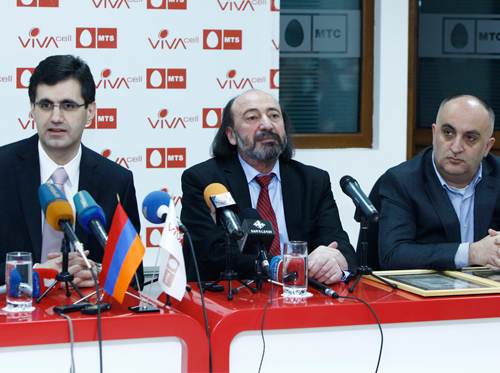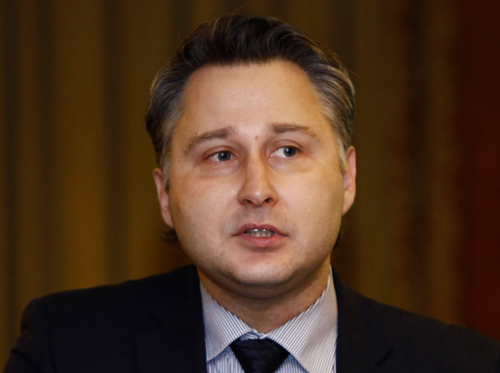Yerevan/Mediamax./ Last week, the issue of introduction of MNP (Mobile Number Portability) was again widely discussed. It was raised by Executive Vice President of France Telecom Europe Benoit Scheen at the meeting with Armenian Minster of Transport and Communications. In the interview to “Delovoy Express” [Business Express] Benoit Scheen noted that the introduction of MNP is probably the only thing Orange failed to achieve in Armenia.
“MNP not only changes the subscriber-operator relations but also principally alters the market concept - the dynamics of the market,” said Benoit Scheen.
“They say MNP will be introduced in Armenia by the end of 2013. This means that we have to live two more years without this dynamics. I think this timeframe is somewhat remote and it’s a pity that people will have to wait too more years to use this service,” Orange Vice President said.
The regulator
Three years ago, in January 2009, the head of the Telecommunications Department of Public Services Regulatory Commission (PSRC), Gevorg Gevorgyan, said in the interview to Mediamax that the PSRC considers the possibility of introducing MNP. He noted then that MNP is one of the elements ensuring competition on the mobile market, but it is more applied in countries with a 100 percent penetration of mobile communication. Gevorg Gevorgyan also said that the saturation of the Armenian market has not yet reached such a scale.
PSRC representative also said then that the introduction of MNP will require legislative changes, because there was only one operator in Armenia - “ArmenTel” - during the adoption of the law “On electronic communication” and it was inappropriate to have MNP in conditions of actual monopoly.
In April 2009, PSRC member Samvel Arabajyan abstained from specifying the timeframes for the introduction of MNP as it was a very intensive and hard process.
“In many countries the transition to MNP service lasted 5-10 years. There are also countries which did not make a transition to this system. We really need formation of markets and infrastructures, the presence of which will allow implementing MNP service in future. At the same time, this does not mean that we will not work in this direction and will not try to introduce MNP quickly. We need consultation help, for which we have turned to donor organizations. To my mind, it will take no less than 1-2 years to make the final decision,” PSRC member said in the interview to Mediamax then.
In summer 2010, Samvel Arabajyan told Mediamax: “To be honest, we haven’t advanced much in this issue since our last interview”.
“My personal opinion is that it’s too early to speak about the introduction of MNP in Armenia. Our market is on the stage of development and we have to understand which of the possible schemes we may introduce in Armenia, because it will be extremely difficult to change the situation after making radical changes. We need a balanced decision with a clear economic justification. I think we need at least 1-2 years to assess the state of the market,” Arabajyan used to say.
In October 2011, Samvel Arabajyan said that the works for the introduction of MNP have already begun. He again abstained from specifying the deadlines, noting that it depends on the readiness of mobile operators to make necessary investments as well as on the solution of some legal issues. Samvel Arabajyan also said that the Public Services Regulatory Commission was going to introduce a “national roaming” service in Armenia in 2012, which “provides almost half of possibilities of MNP”.
The operators
Director General of “FTA-Telecom” (Orange trademark) Christian Boinot said in early 2009 that the introduction of MNP will “give a real choice for mobile subscribers”.
Spokeswoman for ArmenTel Anush Begloyan said in the interview to Mediamax then: “MNP implementation should be regulated by the law and it possesses both positive and problematic aspects. First of all, the issue of how and by whom the number registration will be realized is crucial for any mobile operator. Besides, MNP implementation is associated with significant expenses and, although it will lead to the intensification of non-price competition, it can influence the company’s expenses and intensify corruption risks.”
“Proper monitoring and control over capital and operational expenses and competition norms should be ensured during the implementation of MNP. Therefore, clear legislation must be developed and put in place by the regulating authority for the regulation of MNP prior to the full introduction of the service”, VivaCell-MTS spokesman Vahe Isahakyan stated in an interview to Mediamax.
In March 2009, commenting by Mediamax’s request on the prospect of introduction of MNP, ArmenTel CEO Neicho Velichkov was more honest saying that “this step might be considered a “green light” for one of the players.”
In early 2010, Orange Armenia CEO Bruno Duthoit told Mediamax that “we need MNP, and necessary investments for the introduction of the given service should be divided between all the operators.”
Commenting on the latest meeting of France Telecom Vice President with Armenian Minister of Transport and Communications, ArmenTel and VivaCell-MTS did not make any definite statements. They only hinted that the companies are ready to discuss the issue.
Conclusion
Orange Armenia was obviously greatly interested in the introduction of MNP in Armenia by the time of entrance to the Armenian market or at least immediately after it. It would allow the new player to simplify the process of gathering a subscriber base at the expense of subscribers who are interested in keeping their old numbers. If MNP is introduced in Armenia for example in 2012, it won’t be as effective for Orange as it would have been before, as the new “kernel” of its subscribers has already been formed and the number of “turncoats” from other operators would hardly be critical. Besides, we must not forget either that there will be also a definite outflow of subscribers.
The introduction of MNP is certainly a progressive step which will be for the benefit of subscribers. However, the introduction requires serious financial investments on the part of operators whose earnings keep reducing in conditions of tough competition. Thus, the solution of the issue apparently remains within the frames of the market logic.

17:29 | 24.09.25 | Articles
Jacopo Losso on Cross-Border Investments and Why Armenia Attracts Angels









